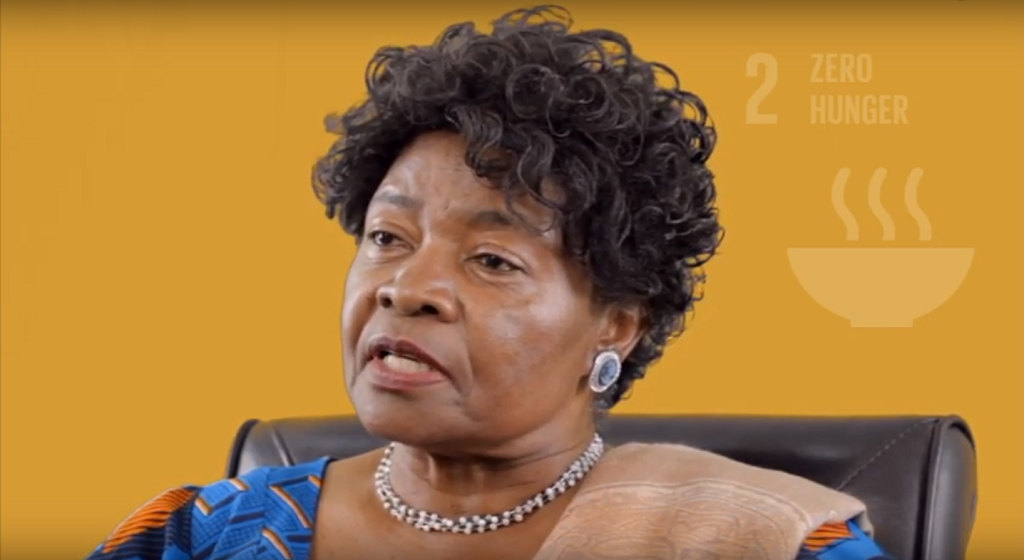CABI board member Professor Dame Anne Glover explains how CABI is delivering on SDG12: Responsible Consumption and Production
[youtube https://www.youtube.com/watch?v=pJ1OqUUhwTY?feature=oembed] In future, farmers will need to produce more food from fewer resources. They will also need to significantly reduce crops losses. But without the right information, farmers cannot easily introduce new, highly productive and sustainable ways of farming. Sustainable production is central to CABI's work. We promote resource efficient farming and help farmers…
Irrigation facilities to enhance all year seed supply by farmers in central Uganda
Lack of access to quality seed, particularly of traditional crops that are not well integrated into the formal sector, remains a key challenge for increased productivity of these crops in African farming systems. CABI, working with national and regional partners, aims to strengthen seed systems in Africa through developing farmer seed enterprises and linkages to…
CABI board member Akhter Mateen explains how CABI is delivering on SDG1: No Poverty
[youtube https://www.youtube.com/watch?v=i3N0PEeKLOU?feature=oembed] One in five people in developing regions still live on less than $1.25 a day and many of these are the 500 million smallholder farmers around the world. But CABI is working hard to help small-scale farmers lift themselves out of poverty. We collaborate with people and organizations working across the supply chain…
CABI board member Roger Horton explains how CABI is delivering on SDG4: Quality Education
[youtube https://www.youtube.com/watch?v=RAQdE3PRzf8?feature=oembed] Sharing scientific agricultural and environmental information helps people tackle global challenges like food security. CABI creates resources that give access to science-based information on agriculture and the environment. Our mission is to improve people's lives worldwide by sharing knowledge. As a scientific publisher we produce materials for academics and researchers that make…
Stuffed and starved: is sufficiency the new efficiency?
Attending a recent Chatham House event, one statistic seemed to encapsulate the crisis of our current food system: 795 million eat too little while 2 billion eat too much. After the initial shock of hearing this, I couldn’t help but wonder; if there’s plenty of food to go around why are we simultaneously starving and…
Capitalising on Africa’s agriculture to achieve ‘zero hunger’
CABI board member Professor Ruth Oniang'o talks about winning the 2017 Africa Food Prize and how CABI is working towards helping to achieve the UN Sustainable Development Goal 2: Zero Hunger.
The chicken or the egg?
Re-blogged from the Plantwise Blog. “I started with just 100 chickens,” begins Mr Jean Claude Ruzibiza. He goes on to explain how from small beginnings he has now become Managing Director of Rwanda Best, a farm producing 4,500 eggs a day and growing fruit and veg to satisfy a significant part of nearby Kigali’s hungry population.…
Unmanned aerial vehicles – Agriculture’s “game of drones”
Unmanned aerial vehicles (UAV’s), more commonly referred to as drones, are not new technology. They have been used commercially since the early 1980’s, but in recent year’s practical application of this technology has grown rapidly across a number of industries, with agriculture playing a key role in this expansion. With the global population expected to…
Agro-tourism on agenda at Mekong Agriculture Ministers Meeting
Planting rice at Siem Reap At the second Greater Mekong Subregion Agriculture Ministers Meeting, which opened yesterday in Siem Reap province in Cambodia, ministers from the six GMS countries – Cambodia, China, Laos, Myanmar, Thailand and Vietnam – are discussing the most important issues in agricultural sectors of the sub-region. The main topics in the…
CABI participates in a regional forum on Enhancing Global Food Security through Science, Technology and Innovation
I recently attended a one-day regional forum organised by the Human Life Advancement Foundation (HLAF) in Thailand. The meeting, held on 17th May 2017, sought to identify ways in which HLAF and other organisations, like CABI, can contribute to achieving food security especially through science, technology and innovation.



